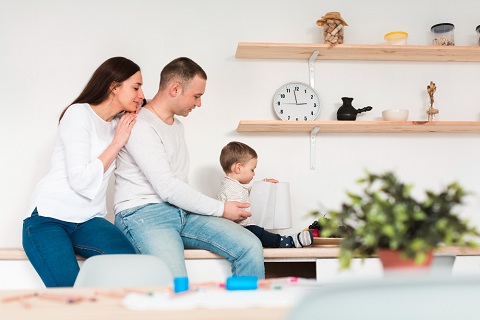Parenting is one of the most important roles a person can undertake, yet it doesn’t come with a manual. Every child is unique, and every parent faces their own set of challenges and joys along the way. However, there are certain best practices that can guide parents in nurturing their children’s physical, emotional, and cognitive development while fostering strong parent-child relationships. In this article, we’ll explore some of the best practices for parenting that can help parents navigate the journey of raising happy, healthy, and resilient children.
Unconditional Love and Acceptance:
At the core of effective parenting is the unconditional love and acceptance of your child. Make it clear to your child that your love for them is unwavering, regardless of their successes, failures, or behaviors. Show affection, praise their efforts, and celebrate their achievements to reinforce their sense of self-worth and belonging. By providing a secure and loving environment, parents lay the foundation for healthy emotional development and positive self-esteem in their children.
Consistent and Clear Communication:
Effective communication is essential for building strong parent-child relationships and fostering mutual understanding. Maintain open lines of communication with your child, encouraging them to express their thoughts, feelings, and concerns openly and without fear of judgment. Listen actively to what they have to say, validate their emotions, and respond with empathy and understanding. Use clear and age-appropriate language to convey your expectations, boundaries, and values, and be consistent in enforcing them. By communicating openly and honestly with your child, you create a trusting and supportive environment where they feel valued and understood.
Positive Reinforcement and Encouragement:
Positive reinforcement is a powerful tool for shaping children’s behavior and promoting desirable qualities such as resilience, confidence, and motivation. Acknowledge and praise your child’s efforts, achievements, and positive behaviors to reinforce their self-esteem and encourage continued growth. Focus on strengths and progress rather than shortcomings or mistakes, and offer constructive feedback and guidance to help them learn and improve. By emphasizing positivity and encouragement, parents nurture their child’s self-confidence and belief in their abilities.
Set Clear and Age-Appropriate Boundaries:
Establishing clear and consistent boundaries is crucial for teaching children self-discipline, responsibility, and respect for others. Set clear expectations for behavior, chores, and responsibilities, and enforce them consistently with positive reinforcement and consequences when necessary. Ensure that boundaries are age-appropriate and tailored to your child’s developmental stage and individual needs. By providing structure and guidance, parents help children feel safe, secure, and supported as they navigate the world around them.
Lead by Example:
Parents serve as powerful role models for their children, and their behavior sets the standard for acceptable conduct and values within the family. Lead by example by demonstrating kindness, empathy, and respect in your interactions with others, including your child. Model healthy communication, problem-solving, and conflict resolution skills, and showcase positive behaviors such as resilience, perseverance, and compassion. By embodying the values and behaviors you wish to instill in your child, you create a positive and nurturing environment where they can learn and grow.
Encourage Independence and Responsibility:
Fostering independence and responsibility is essential for helping children develop essential life skills, confidence, and resilience. Encourage your child to take on age-appropriate tasks and responsibilities, such as dressing themselves, completing chores, or making decisions. Offer guidance and support as needed, but allow them the freedom to learn from their experiences and make mistakes. Encouraging independence helps children develop a sense of competence and self-reliance, preparing them for success in school, relationships, and life.
Provide Structure and Routine:
Children thrive on routine and predictability, as it provides them with a sense of stability, security, and comfort. Establish daily routines for meals, bedtime, homework, and other activities, and stick to them as much as possible. Provide structure and consistency in your child’s daily life, balancing opportunities for exploration and play with moments of rest and relaxation. A structured environment helps children feel safe and confident, enabling them to focus on learning, growing, and thriving.
Encourage Healthy Habits and Self-Care:
Promoting healthy habits and self-care is essential for supporting children’s physical, emotional, and mental well-being. Encourage your child to eat a balanced diet, get regular exercise, and prioritize sleep to support their overall health and development. Teach them the importance of good hygiene, self-care practices, and stress management techniques to promote self-esteem and resilience. Lead by example by prioritizing your own health and well-being, and emphasize the importance of self-care as a family value.
Create Opportunities for Quality Time:
Spending quality time together as a family is essential for building strong bonds, fostering communication, and creating cherished memories. Make an effort to carve out dedicated family time each week for shared activities, such as meals, outings, or game nights. Engage in meaningful conversations, active listening, and bonding activities that strengthen relationships and promote connection. Prioritize family time as an opportunity to reconnect, recharge, and nurture the parent-child bond.
Seek Support and Guidance:
Parenting is a journey filled with challenges and uncertainties, and seeking support and guidance can help navigate the ups and downs along the way. Reach out to trusted friends, family members, or parenting groups for advice, encouragement, and solidarity. Take advantage of parenting books, online resources, or professional counseling services for additional support and guidance. Remember that it’s okay to ask for help and that you’re not alone in your parenting journey.
Conclusion:
Effective parenting requires a combination of love, communication, consistency, and support to nurture children’s growth, development, and well-being. By practicing unconditional love and acceptance, maintaining clear and consistent communication, providing positive reinforcement and encouragement, setting clear boundaries, leading by example, encouraging independence and responsibility, providing structure and routine, promoting healthy habits and self-care, creating opportunities for quality time, and seeking support and guidance when needed, parents can create a positive and nurturing environment where children thrive and flourish. Embrace these best practices for parenting and enjoy the journey of raising happy, healthy, and resilient children.



